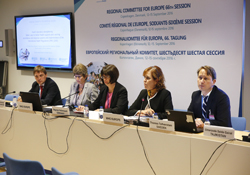Regional Committee technical briefing on health laboratory strengthening

WHO
The technical briefing, which took place in Copenhagen, Denmark, on 14 September 2016, reported on WHO/Europe’s work on strengthening national laboratory capacity in the Region, including the Better Labs for Better Health initiative. The initiative’s activities build laboratory capacity across the Region through partnerships, intersectoral collaboration and mentoring. During the briefing, national experiences and models of good practice in laboratory strengthening were described, along with experience of laboratory policy and strategy development and training in quality management.
The Russian Federation and Sweden reported on their initiatives to improve laboratory capacity to provide quick, reliable results and their cooperation in making their expertise available to other countries. Tajikistan and Uzbekistan reported on their progress in improving laboratory quality through training and other measures, in collaboration with the Better Labs for Better Health initiative.
In the subsequent discussion, Dr Thomas Tolfvenstam from the Public Health Agency of Sweden and Professor David Harper from the Centre on Global Health Security highlighted the serious consequences with regard to the International Health Regulations (2005) of both false negative and false positive results, and the great importance of laboratory quality in this respect.
Generally, it was felt that WHO has an important role to play in helping countries to work together more closely to improve laboratory quality and in helping countries with more laboratory capacity to support those with less.
WHO support in strengthening laboratory capacity
Timely and precise identification of pathogenic threats is vital in preparing for, and thus also containing, health emergencies related to outbreaks. Consequently, laboratories play a critical role in public health and developing the laboratory sector is one of the key goals for the implementation of the International Health Regulations (2005). WHO actively supports Member States in their efforts to meet their commitments in this area.



